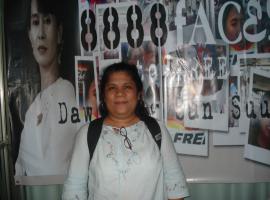
Ellene Sana is the Executive Director of the Centre for Migrant Advocacy (CMA) in Manila, and a former chair of Migrant Forum in Asia (MFA). CMA is a policy advocacy group promoting the rights of Filipino migrant workers and their families. Ellene’s association with DTP goes back a long way, to when she was involved in the Philippines solidarity movement supporting the struggle of the East Timorese peoples for self-determination – of which DTP founder José Ramos-Horta was a leader.
“DTP has been working for more than 30 years. It has gone a long way in promoting human rights and human rights culture in the Asia-Pacific and globally, especially among the most vulnerable including Indigenous people, migrant workers, and those struggling for democracy.”
Through the COVID pandemic, migrant workers suffered more than many others – they lost their jobs, their wages went unpaid, they were stranded far from home and subjected to more discrimination and restrictions.
Ellene’s work for the rights of migrant workers spans the local to the global. She has seen the sacrifices made by so many migrant workers and their families, as well as their resilience and solidarity.
Over the last 18 years, Ellene has been a key trainer and inspirer on DTP’s migrant workers’ programs. In these programs, Ellene shares her knowledge and experience in advocacy for the rights of migrants, which has involved successful advocacy to repatriate stranded migrant workers, win the release of detained migrant workers, reunite separated families and reform government policy and programs.
As a DTP trainer, Ellene inspires participants through example. She builds the confidence of participants while nurturing their knowledge and skills, supporting their engagement with diplomats, labour attaches and UN officials in DTP programs. She shares good practices from the Philippines, including in relation to shelters for migrant workers and pre-departure training and regulation of recruitment agencies. She has led sessions on gender and labour migration, and how to engage with the UN human rights mechanisms.
“DTP training programs are relevant and responsive to the times. The methodology and approach are participatory. The learning process is very encouraging, and it’s a very safe and friendly environment. Participants learn a lot and at the same time have fun.”
One of the signature projects of the CMA is to build the capacity of community-based migrant organisations and local governments in the Philippines through training programs Ellene says the CMA training programs follow the training program on migrants rights which was a spin-off project of DTP, jointly conducted with Migrant Forum in Asia, since 2004.
“The DTP-MFA training model inspires our training programs. We have been conducting training programs for the past seven years. We even refer to the training program which is a basic Course on Migration (Migration 101) as local DTP,” Ellene said, “our training focuses on migrant rights, governance and access to justice. When I need some information, or I need to consult, I know I could reach out to DTP-MFA alumni and DTP secretariat at any time.”
Ellene loves the work she does because there is a lot of passion and fulfilment in this work.
“ I am doing something good not only for me and for my family, but also for the migrant sector. There is a kind of fulfilment when I can provide useful information to migrant workers trying to find answers.”
DTP acknowledges the traditional custodians of the land on which we work, the Bedegal people of the Eora Nation. We recognise their lands were never ceded, and we acknowledge their struggles for recognition and rights and pay our respects to the Elders – past, present – and the youth who are working towards a brighter tomorrow. This continent always was and always will be Aboriginal land.
Aboriginal and Torres Strait Islander peoples should be aware that this website contains images or names of people who have passed away.
DTP acknowledges the traditional custodians of the land on which we work, the Bedegal people of the Eora Nation. We recognise their lands were never ceded, and we acknowledge their struggles for recognition and rights and pay our respects to the Elders – past, present – and the youth who are working towards a brighter tomorrow. This continent always was and always will be Aboriginal land.
Aboriginal and Torres Strait Islander peoples should be aware that this website contains images or names of people who have passed away.
Privacy Policy | Terms of Use | Disclaimer | Policies
© 2022 Diplomacy Training Program | ABN 31 003 925 148 | Web Design by Studio Clvr